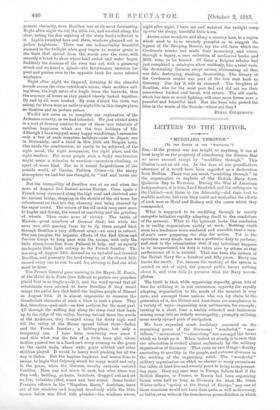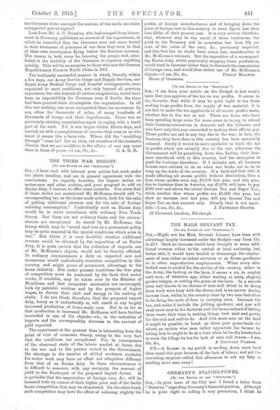LETTERS TO THE EDITOR.
"MUDDLING THROUGH." rTo TEN EDITOR OP TIDO " BPRCTATOR."T But,—If the present war has taught us anything, it has at least taught us the propriety of abandoning the illusion that we never succeed except by "muddling through." This illusion is not an old one. In the days of our grandfathers utterance of it would have been regarded as a declaration from Bedlam. There was not much "muddling through" in the organization or exploits of the British Navy from Quiberon Bay to Navarino. During the War of American Independence, it is.true, Lord Sandwich and his colleagues in. the Cabinet—not those in the Admiralty—did their best to muddle matters, but even they could not neutralize the efforts of such men as Hood and Rodney and the crews which they commanded.
What is supposed to be muddling through is merely energetic initiative rapidly adapting itself to the conditions of the moment. What to the ignorant looks like confusion is in reality organization visibly at work. Nothing could seem to a landsman more confused and anarchic than a man- of-war's crew preparing the ship for action. Yet in the operation every single man has a particular duty to perform ; and such is the organization that, if any individual happens to be incapacitated, his duty is taken over by others so that performance of it is assured. That has been the system of the British Navy for a hundred and fifty years. Every one knows the result. Yet, because the working of the system is carried on out of sight, the general public knows nothing about it, and even fails to perceive what the Navy accom- plishes.
The truth is that, while organizing capacity, given lots of time for utilizing it, is not uncommon, capacity for rapidly adapting organization to the zteeds of the moment is very rare; and amongst those nations who can lay claim to the possession of it, the British and Americans are conspicuous in a variety of ways—organizing new settlements, for example; turning in a short time a hastily collected and boisterous mining camp into an orderly municipality ; promptly utilizing some newly opened path of navigation.
We have expended much laudatory comment on the organizing power of the Germans; "wonderful," " mar- vellous," "miraculous," "astonishing" are amongst the terms which we lavish on it. When looked at closely it is seen that our admiration is evoked almost exclusively by the military organization of Germany. That rests on two things—docility amounting to servility in the people, and extreme slowness in the working of the organizing mind. The " wonderful " military organization on which we shower so many encomiums has taken at least five-and-twenty years to bring to its present- day state. Does any sane man in Europe believe that if the British Empire, or France, or Russia bad been organizing forces even half as long as Germany for what Mr. Owen • Wister calls a " spring at the throat of Europe," any one of those countries would not have done quite as well as Germany, or better, even without the treacherous premeditation in which the Germans alone amongst the nations of the earth can claim unimpaired patent rights P Taist June Mr. A. C. Dunstan, who had escaped from intern- ment in Germany, published an account of his experiences, in avhich he remarked that the Germans were not more brutal in their treatment of prisoners of war than they were in that of their own countrymen flying before the Russian invasion. The reason in both cases he, knowing the people well, attri- buted to the inability of the Germans to organize anything quickly. This will he no surprise to those who saw the German 'Expeditionary Force in North China in 1901.
The brilliantly successful manner in which, literally within a few days, our Army Service Corps and Supply Services, our Royal Army Medical Corps and hospital arrangements, were organized to meet conditions, not only beyond all previous experience, but also beyond all serious imagination, would have been an impossibility for Germans even if double the time had been granted them to complete the organization. In all this war nothing was more unexpected than the movement by sea, often for thousands of miles, of many hundreds of thousands of troops and their i mpedintenta . There was no previously existing organization equal to coping with a tenth part of the work. Yet it was begun within fifteen days, and carried on with a completeness of success that even to us who know it seems like a fairy-tale. Where did the "muddling through" come in ? Let us, then, rid ourselves of the fantastic illusion that we are muddlers in the affairs of war any more than in those of peace.—I am, Sir, eee., O. A. G. B.















































 Previous page
Previous page